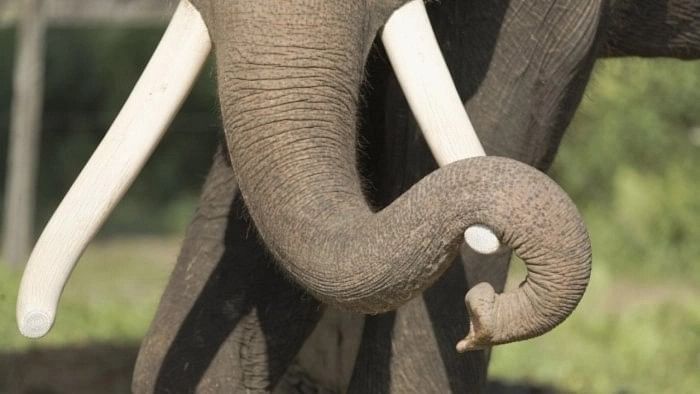
Representative image of elephant.
Credit: iStock Photo
Around 5 pm the other day, the landline trilled insistently in the old colonial bungalow we occupy on the outskirts of Munnar. It was the nurse calling from the nearby hospital, her voice tinged with alarm: “Don’t come out for your evening walk, sir! A wild elephant’s coming up the road!”
Hardly five minutes later, a massive tusker dwarfed our front gate as he eyed our rambling residence and garden, looking quite literally like the proverbial monarch of all he surveyed! I recognised him as Oosikomban—so nicknamed locally because of his long and pointed tusks.
Flanks heaving and tufted tail swinging, he soon majestically padded into the compound, his tusks looking truly impressive. He went right through the porch, heading purposefully towards the lawn. As my wife and two grandchildren cowered in the sitting room, I timidly spied on the intruder through the bay windows. Unbelievably, he was hardly six feet from the glass panes, making his nearness scary.
Crossing the lawn, Oosikomban unerringly headed for the corner of the garden where a small patch of tender bamboo shoots grew wild—an irresistible magnet for wandering wild elephants. From the safety of the sitting room, we watched in awe as the tusker relished the bamboo shoots, razing the entire clump. Then he selectively stripped off and guzzled most of the parasitic creepers choking a huge, flowering wild bush—apparently another elephantine delicacy. Next, he moved to the greenhouse and peered through a window at the potted plants stored inside, his tusks dangerously close to the flimsy structure.
Locals usually scare off elephants that raid their painstakingly cultivated vegetable gardens by banging tins and raising a ruckus. However, being isolated and knowing the unpredictability of wild pachyderms all too well, we ruled out such ‘heroics’ and remained passive spectators. As dusk set in, Oosikomban casually opened a garden tap to slake his thirst—he’s apparently used to doing this as some local elephants are—and then, to our surprise, turned it off as well—which intruding pachyderms never do. A further surprise awaited us. Gently opening the rear gate with his trunk, he exited our compound, pulling the gate shut behind him—in sharp contrast to other departing elephants who invariably kick down the gate.
In retrospect, we could only marvel at Oosikomban’s intelligence and considerateness, unlike some of his wild contemporaries, who usually leave a trail of destruction (and frazzled nerves) behind them. Was it, I wondered, a demonstration of his desire for peaceful co-existence with humans?